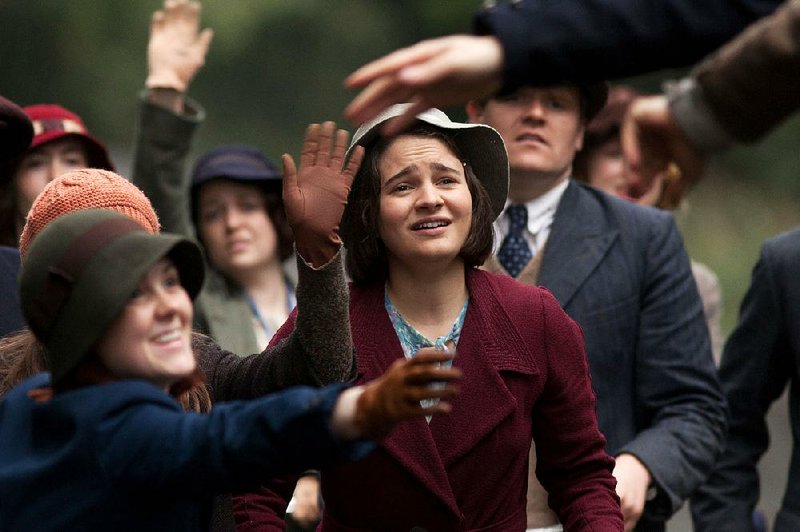"Does it break your heart or does it fill you with hope?"
This is the question posed by a character leading a reading group's discussion of William Butler Yeats' poem "The Song of Wandering Aengus" at the rural community center referred to in the title of British social-realist Ken Loach's Jimmy's Hall. Given that Loach, now 79, has said that this will be his last fiction feature, there's another layer of poignancy in that question. Loach has had a long, interesting and uneven career, highlighted by his 1969 masterpiece Kes, which stands with Truffaut's The 400 Blows as one of the greatest movies ever made about feral children, and the devastating The Wind That Shakes the Barley, which won the Palme d'Or at the 2006 Cannes Film Festival.
Jimmy’s Hall
85 Cast: Barry Ward, Jim Norton, Simone Kirby, Aisling Franciosi, Brian F. O’Byrne
Director: Ken Loach
Rating: PG-13, for language and a scene of violence
Running time: 109 minutes
This film could be seem as a gentler (and lesser) companion piece to Barley, which was set during the Irish War of Independence (1919--1922) and the Irish Civil War (1922--1923). It's now 1932, and after a decade of exile in New York (the tenor of which is suggested by black and white newsreel footage of the city set to the scratchy, warm sounds of 78 rpm jazz), Jimmy Gralton (Barry Ward) has returned to Ireland's County Leitrim to live quietly and care for his aging firebrand of a mother. (Gralton, his eventual fate and the hall he helped found all have real-world analogues; much of the rest of the story is invented or embellished.)
It's suggested that Jimmy has seen the world and that he has much to impart to the folks he left behind, including his old sweetheart Oonagh (Simone Kirby), who in the interim has married a solid man. Jimmy is immediately urged by local teenagers to reopen the meeting hall he'd help found and run before he'd left. Among the teens is Marie O'Keefe (Aisling Franciosi), the daughter of an army commander (Brian F. O'Byrne) who has long considered Jimmy a dangerous subversive.
Initially reluctant, Jimmy agrees to reopen the Pearse-Connolly Hall on his family's land. This hall, which played an important role in Gralton's self-imposed exile, isn't too different from a neighborhood YMCA -- there are classes in music, poetry and boxing, and in the evenings people gather there to dance and socialize. The local priest, Father Sheridan (Jim Norton), sees it as a direct affront to the church's authority. In his view, only the Holy Mother Church is appropriately equipped to educate the people.
If you're familiar with Loach's oeuvre it's unlikely you'll be surprised by his portrait of Jimmy and his mother as secular, pragmatic types primarily concerned with the welfare of their friends and neighbors, common folks whom they see as victimized by the "pastors and the masters." Jimmy comes across as a salt-of-the-earth populist hero, determined to stand for the dignity of the working class. (If Loach underplays the historical Gralton's Stalinist inclinations, it may be that he's simply trying to stay true to the nature of the times. In 1932, it was still possible for the naive to hold a good faith belief in the efficacy of collectivization.)
All the performances are fine, although Loach and writer Paul Laverty sometimes task their actors with difficult speeches. The cinematography, by Robbie Ryan, reveals a beautiful yet more earthy land than the traditional emerald paradise. Bog blacks, wood browns and stone gray complete the palette's greens.
Yet in the end, the film feels underpowered and even a bit mawkish, with Jimmy coming off as less a potential revolutionary than a good government wonk. Anyone who's not at least a little familiar with Irish history will probably be baffled by the seemingly outsize reaction he provokes, but he doesn't come off as a genuine martyr either. In the end, the matter-of-factness of the storytelling defeats Loach's always pointed politics.
That's one of the problems of arguing politics through art -- people are always more complicated than their ideologies. It's entirely possible that the real-life Jimmy was a stalwart, decent man and a communist. But Loach soft-pedals Jimmy's politics, and it feels like a cheat. Loach has always banked his anger with an indefatigable optimism in the chances of human beings doing better. It's a quality that's made him one of my favorite filmmakers.
But Jimmy's Hall is a soft-focus, minor film. It's not bad, but it could have been better. Hence the heartbreak.
Email:
pmartin@arkansasonline.com
www.blooddirtangels.com
MovieStyle on 09/11/2015

